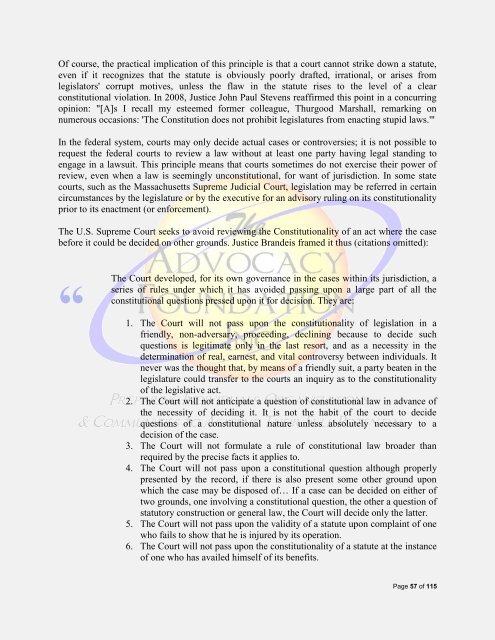Judicial ReEngineering
Judicial ReEngineering
Judicial ReEngineering
You also want an ePaper? Increase the reach of your titles
YUMPU automatically turns print PDFs into web optimized ePapers that Google loves.
Of course, the practical implication of this principle is that a court cannot strike down a statute,<br />
even if it recognizes that the statute is obviously poorly drafted, irrational, or arises from<br />
legislators' corrupt motives, unless the flaw in the statute rises to the level of a clear<br />
constitutional violation. In 2008, Justice John Paul Stevens reaffirmed this point in a concurring<br />
opinion: "[A]s I recall my esteemed former colleague, Thurgood Marshall, remarking on<br />
numerous occasions: 'The Constitution does not prohibit legislatures from enacting stupid laws.'"<br />
In the federal system, courts may only decide actual cases or controversies; it is not possible to<br />
request the federal courts to review a law without at least one party having legal standing to<br />
engage in a lawsuit. This principle means that courts sometimes do not exercise their power of<br />
review, even when a law is seemingly unconstitutional, for want of jurisdiction. In some state<br />
courts, such as the Massachusetts Supreme <strong>Judicial</strong> Court, legislation may be referred in certain<br />
circumstances by the legislature or by the executive for an advisory ruling on its constitutionality<br />
prior to its enactment (or enforcement).<br />
The U.S. Supreme Court seeks to avoid reviewing the Constitutionality of an act where the case<br />
before it could be decided on other grounds. Justice Brandeis framed it thus (citations omitted):<br />
“<br />
The<br />
Court developed, for its own governance in the cases within its jurisdiction, a<br />
series of rules under which it has avoided passing upon a large part of all the<br />
constitutional questions pressed upon it for decision. They are:<br />
1. The Court will not pass upon the constitutionality of legislation in a<br />
friendly, non-adversary, proceeding, declining because to decide such<br />
questions is legitimate only in the last resort, and as a necessity in the<br />
determination of real, earnest, and vital controversy between individuals. It<br />
never was the thought that, by means of a friendly suit, a party beaten in the<br />
legislature could transfer to the courts an inquiry as to the constitutionality<br />
of the legislative act.<br />
2. The Court will not anticipate a question of constitutional law in advance of<br />
the necessity of deciding it. It is not the habit of the court to decide<br />
questions of a constitutional nature unless absolutely necessary to a<br />
decision of the case.<br />
3. The Court will not formulate a rule of constitutional law broader than<br />
required by the precise facts it applies to.<br />
4. The Court will not pass upon a constitutional question although properly<br />
presented by the record, if there is also present some other ground upon<br />
which the case may be disposed of… If a case can be decided on either of<br />
two grounds, one involving a constitutional question, the other a question of<br />
statutory construction or general law, the Court will decide only the latter.<br />
5. The Court will not pass upon the validity of a statute upon complaint of one<br />
who fails to show that he is injured by its operation.<br />
6. The Court will not pass upon the constitutionality of a statute at the instance<br />
of one who has availed himself of its benefits.<br />
Page 57 of 115

















